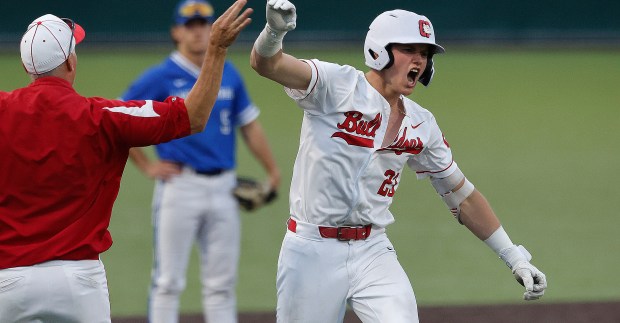Fresh off a rare defeat in Springfield, Gov. JB Pritzker on Tuesday delivered some of his sharpest words yet against Mayor Brandon Johnson.
At an unrelated news conference, the governor staunchly defended his support for a bill to strongly regulate hemp sales. Johnson spent the past several days lobbying against the legislation, citing revenue concerns for the city, until the House vote was pulled Monday evening due to lack of support.
Pritzker maintained the bill’s effective ban on hemp, used in products such as delta-8 and delta-10 THC that get users high, is a public health priority but refused to give Johnson any credit for halting his efforts during the final stretch of the Illinois General Assembly’s lame duck session.
“The mayor, my impression is he didn’t have much to do with this,” Pritzker said. He went on to also knock Speaker Emanuel “Chris” Welch and other House Democrats: “It’s a tragedy that the bill didn’t pass. The mayor had very little to do with the ultimate result. I think there was a raucous meeting of the Democratic House caucus, in which there was a lot of yelling at (Pritzker administration) staff by people who are opposed to the bill, that the Speaker did not intervene about.”
“Certainly what happened with regard to the hemp bill is potentially a demonstration of challenges that the House will have in organizing to overcome some of the challenges that we’re going to face this spring,” Pritzker also said.
The governor’s unusually sharp remarks signaled more discord ahead not just in the Democrat-controlled General Assembly, where the governor has maintained a tight lock over the supermajority of Democrats, but for Johnson’s ongoing Springfield agenda.
The mayor will now be emboldened fresh off his victory on the hemp issue, but he has a string of tough asks for the state ahead, such as more Chicago Public Schools funding and a bailout on the impending CTA fiscal cliff. That comes as Illinois is expected to face a multibillion-dollar deficit in the next fiscal year’s budget.
When reporters at Pritzker’s Tuesday news conference sought details on the nature of his relationship with Johnson, the governor said “They don’t reach out that often.”
“It seems like they don’t have good relationships in Springfield, in part because they don’t do the outreach that’s necessary,” Pritzker said. “He doesn’t call very often. Maybe in the time that he’s been mayor, he’s called me, perhaps, five times?”
The governor said Johnson did not call his administration over the hemp bill even as the mayor told state legislators he wanted in on negotiations, a sign that Johnson was seeking to go around Pritzker’s political apparatus.
Regarding the city’s most recent budget cycle for the 2025 fiscal year, in which Johnson raced to plug a $1 billion deficit, Pritzker said: “Literally the last call that we got from them was in September and then once in December.”
“We, by the way, scheduled calls,” Pritzker said. “And then they didn’t show up. And then there was a December call that happened in which they didn’t ask for anything. … But again, he has my number.”
The mayor’s direct involvement in lobbying against the hemp bill came at least two years after discussions to crack down on hemp sales in Illinois began in Springfield.
Unlike state-licensed legal cannabis, hemp shops have no legal age restriction, no requirements to test and label their products for potency and purity, and don’t have to pay the same high fees and taxes. As a result, there have been cases of minors getting medical treatment after ingesting the products, and growing hemp sales have cut into the licensed marijuana market.
But smoke shops and other stores that sell the product say the law is so restrictive that it would put many of them out of business.
In a written statement Tuesday morning, the mayor argued regulation is the key to safe hemp sales as well as fostering business. The leadership of the Chicago delegation in Springfield was critical in ensuring the communities of Chicago and other municipalities were central to the conversation,” Johnson said in the statement. “We must prioritize communities, while ensuring our negotiations do not unnecessarily create winners and losers in the industry.”
Check back for updates.



